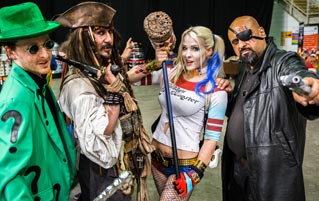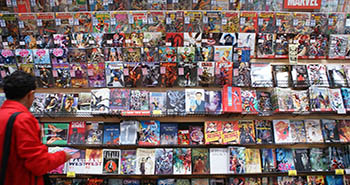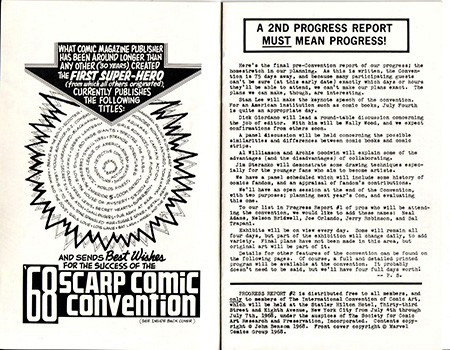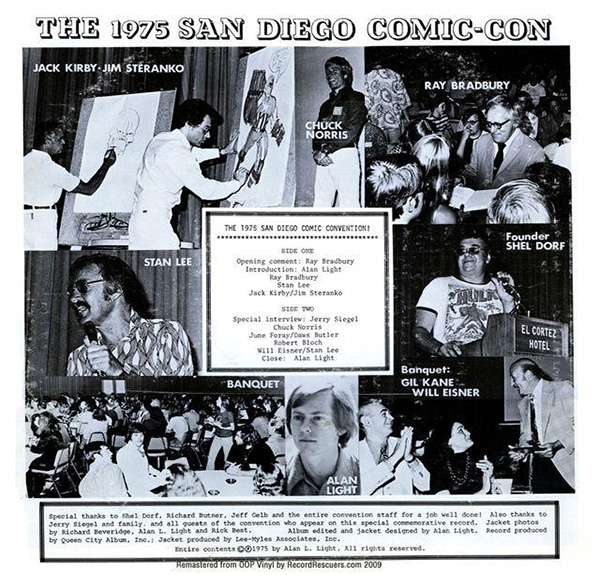We Asked The Guy Who Drew Superman About Comic-Con's History

It's Comic-Con time! Statistically speaking, about 20 percent of the people reading this are there right now. For a certain kind of nerd, it's the equivalent of a pilgrimage to Mecca: spiritually fulfilling, extraordinarily expensive, and primarily profiting the Saudi royal family.
But Comic-Con wasn't always a pop culture bacchanal of elaborate costumes, star-studded panels, and drug-fueled parties. We talked to early fan (and current media critic) Brian Lowry and legendary comics artist and early keynote guest Neal Adams. (He drew Superman, Batman, the X-Men, and, at various points, roughly 40 percent of your childhood.) Here's what they told us about the early-ass days of a geek culture touchstone.
When Comic-Con Started, Comics Were A Shameful Business
In the late '60s, the comic book industry was barely clinging to life after years of social stigma, rotten sales, and lack of interest by readers. Neal could have put "I drew Superman" on his resume, but that wouldn't necessarily have been a smart move. In fact, if you'd popped out of a wormhole to tell him that in a few decades, the characters he drew would be the biggest names in pop culture, he'd have hit you in the teeth for your filthy lies.
As the 20th century edged into its second half, comics found themselves under attack by, well, one of the biggest things that you can be attacked by: Congress. And as Neal explained, this was because some people thought that a love of The Flash would turn you into a hoodlum, stealing milk money and listening to Elvis after 8 p.m.:
"... because obviously led to juvenile delinquency, and they should be burned, tossed in the garbage, whatever. And the sales of comic books were terrible. When I got out of high school and fell into this industry, they told me that comic books would be out of business in a year. So I did other things, and several years later I fell back into comic books, and they still hadn't disappeared."

One day, though ...
Today, comic books are a wild medium where anything can happen. Batman can be a Soviet Commissar. The Hulk can be a Las Vegas enforcer. Superman can be charismatic. But back then, after the attacks by Congress, work became pretty limited: "The leftover companies and artists continued to believe they would be out of business in a year, to the extent that they destroyed comic book artwork when they no longer needed it, they had no contracts or agreements . Nothing was important, nobody cared, everybody walked around with a long face, everybody was ashamed that they did comic books."
Then, into this period of doubt came a fine gent named Phil Seuling. An English teacher and bookstore owner, Seuling would put together the New York Comic Art Convention in 1968.

To put this in a timeframe that superhero fans can understand, Robert Downey Jr. was three.
Though this wasn't the first comic convention (Stan Lee's Yell-At-You-About-Spider-Man-In-The-Streets-Of-Brooklyn-Fest was a classic event), it was the largest one ever organized until the San Diego Comic-Con began two years later. Neal Adams was one of the first keynote speakers at that event. He described the early Comic-Cons as basically a Hail Mary for the concept of "comic books."
"So you had this business that was about to go out of business, and on the outside you had these fans. And they were there, but because we didn't have the internet, nobody really knew how you would contact other comic book fans." Conventions basically did the job of the internet before the internet was around to make it clear that comic book fans collectively had billions of dollars to spend on their hobby. Neal's first Comic-Con was the second one ever, in 1971.
"There was me, Jack Kirby, and two other people. And they had a kind of luncheon in the El Cortez hotel, and there were four tables, and there were ten people around the tables, and they essentially paid for the artists' meal." Jack Kirby helped create Captain America. And the Hulk. And the Fantastic Four. And the Avengers. But back then, he was such small potatoes that anyone who enjoyed comics and wandered into San Diego could have lunch with him and the dude who drew Superman, provided they picked up the check.

"Sure, you can sit here ... as long as you're faster than a speeding bullet with your wallet."
"... they got to hang out with the artists and bullshit and talk. Jack was at one table, I was at another, and these other two were at another table. And that became one of the featured events at the later conventions. Phil did similar things, and because he was in a hotel, he could rent two rooms one year, then eight rooms the next. And sometimes they were on different floors, but the fans didn't care, they could go on different floors and listen to Harlan Ellison talk or me talk, whoever was around. The conventions became more and more popular. You would have as many as ten guest artists." For reference, it'll take you around 20 minutes to read through all the guests for the 2017 Comic-Con.
Later, Seuling would strike a deal with the major comic publishers (including DC and Marvel) to buy a ton of comic books off of them and sell them in his shop without returning them. This created what would become known as the "direct market" for comic books, and began the era of comic shops, allowing comics to sell for better prices and comic nerds to get their fix without doing it next to someone else buying the latest issue of Newsweek.
So in the beginning, Comic-Con was helping to keep the industry alive, or at least on life support, until Hollywood started to care about Captain America and the sundry Men of Bats/Iron/etc. But despite it seeming like a no-brainer now, they didn't always have it nailed down ...
The Studios Didn't Get It At First
At this year's Comic-Con, fans can expect to see footage from Marvel's Infinity War and Thor: Ragnarok. On the DC front, we'll probably get our first look at Aquaman and hear the official announcement for Wonder-Woman 2: Sword On Her Back Boogaloo.
So Hollywood suits are very experienced at making comic conventions work for them. But we only got to this current state of affairs through tremendous trial and error. When Warner Bros. released the first footage of their Superman movie at the 1978 Comic-Con, it was a complete disaster. Brian Lowry was there:
"There was a presentation for Superman, with Christopher Reeve, before the movie opened. And they didn't have any footage to show, but everything they said sort of irritated the fans. They talked about the character in a way which created an impression that was sort of a comedic, non-serious approach to Superman. It had people in the room groaning and hissing. Of course the movie ended up doing great, and I'm sure everybody in the room saw it, but at the time it was kind of a symbol that didn't know how to talk to ."

"My favorite part of the film is when Lex Luthor makes fart noises with his armpit for nearly an hour."
Not every movie had the same troubles. Alien was a huge hit at its Comic-Con presentation, according to Lowry, but the people running it were smart enough to bring along H.R. Giger's artwork instead of just giggling about space penises on stage for an hour. So what did it take to yank the studios into working with Comic-Con's audience? Somewhat unsurprisingly, it was the success of Demigod George Lucas, and actually listening to creators of comic books.
"Within a few years of , you saw these companies basically hiring guys or developing guys who could really talk to the fans in a language they would understand and who really knew this stuff. That was a big threshold they had to cross, where they started presenting in a way that would actually build anticipation for them."
According to Neal, a big part of the problem Hollywood had with translating early comics was the frequent onomatopoeia used in fights scenes, like "wham" and "blap." Today we just see that stuff as what it is: a way to describe sounds in visual storytelling. But for some reason, generations of directors thought "biff" and "pow" were somehow critical to fans' love of the genre. Here's Neal:
"The problem is that Hollywood had to get over that Batman thing -- biff, bam, pow, the silly, satirical approach. And it took them a long time to get past it, because it seemed to be what it was all about to people who weren't comic fans. You would have to sit down with producers and directors and say, 'OK, where it says bam? That's a sound effect, like when Errol Flynn punches somebody and you hear a sound. That's what that is, it's just another form. We don't want it to say BAM, that's stupid. If you want to do stupid comic books, then keep doing the junk you're doing, but if you want to do realistic comic books, then treat them like a storyboard for a movie.' And it's taken quite a bit of time, and the people who have become the most successful are the people who get it."

"Those 'pow's would take up half the screen! No one will pay to see that!"
And in the long, long years between the first Comic-Con and the birth of comic book movies as a respectable genre ...
The Comic Book And Toy Dealers Were The Main Draw
For those of you reading this while waiting in line to get Chris Evans to autograph your homemade tights, the most shocking thing about the old Comic-Con is that it was about selling comics.

People bought the things they were interested in? Sounds fishy.
Brian reveals the shocking truth:
"Originally, this was a convention where you had comic dealers who would schlep down or across the country ostensibly to sell. There just weren't that many things outside of to keep you occupied. Now there are panels all day long and events that go into the evening. You could easily go to Comic-Con and basically never venture into the dealers' area. I have gone to the dealers' floor a few times over the years and heard people grousing that aren't doing enough to get people to come out and actually buy. And when all the emphasis is on panels and movie presentations -- things that keep people out of the dealer areas -- it doesn't help them in terms of selling their stuff."
It's entirely possible that most modern Comic-Con attendees will leave San Diego without ever buying a comic. But Adams argues that the current state of the convention has still been good for them:
"Let's say in New York you have a comic book convention in the Penta hotel . Well, you're maybe going to get 3,000-5,000 people, and that's a crowd. Well, right now we have a convention in the Javits that has 90,000 people. You certainly have enough people there to buy comic books from the guys who bring the long white boxes. You also have enough people who will buy signatures from actors and enough people who will go there and do cosplay."
"You've got a much larger population of people who go to conventions, and if the people who are selling comic books want to sit and cry into their beers that every one of the cosplayers aren't coming and buying comic books, they should be ashamed of themselves, because that's ridiculous. They get enough people in. I've had conversations with guys as little as two weeks ago who will tell me, 'Hey, we had a good weekend, we did $50,000.' Well, you didn't do $50,000 back in 1977, believe me. You did $1,000 if you were lucky, maybe $800. So people do tend to complain, but it just falls on deaf ears if you have any experience and a little bit of history."
The other group of people who did big business then, as Adams recalls, were the toy vendors. A lot of their business was actually helped along by Adams, but the whole comics industry was so primitive that he didn't make a dime:
"What the comic book fans would buy at the conventions would be toys, Batmobile toys from Mego and the various companies. The toy market was essentially licensing of toys, and DC Comics for the most part, when I started working for them, they would 'borrow' my drawings and send them to these licensors, and the licensors, seeing an upgrade of their favorite characters, would buy more licenses, and they would have toys, games, T-shirts, pajamas, and pillowcases. The licensing grew very quickly in the '60s and '70s, and my art appeared everywhere. And once in awhile I would go to them and go, 'Shouldn't I get a little money from this?' , 'Don't you feel privileged that they're using it on all their toys and stuff?' , 'Yeah, but I gotta feed my family.'"
Yes, aside from the eternal problem of going broke due to various collectible-buying-related issues, it was truly a different era. And that's especially true because ...
Cosplay Was Not A Thing
Comic-Con 2017 will spawn the creation of enough pictures and videos to fill several Libraries of Alexandria. But it's actually pretty hard to find good photos of some of the older cons. This collage from 1975 features a Stan Lee who is either about to sing in a seedy lounge or shout into a microphone beside Hulk Hogan:

Honestly, considering that it's Stan Lee, those careers don't sound too crazy.
You'll notice absolutely no evidence of costumes. Check out that banquet on the bottom left. People are wearing suits. It turns out Comic-Con didn't even add a costume competition until 1974, and Adams for one didn't see a lot of cosplayers in the early days:
"It didn't exist, who would do such a thing? You wouldn't put on a Halloween mask to go to a comic convention; you go there to buy comic books. It kind of snuck in under the radar. You'd get somebody who'd come to a convention dressed as Dick Tracy, and you'd go 'Huh, Dick Tracy, cool.' Then you'd see somebody else as Betty Boop. It was kind of a by-the-way entertainment, but suddenly it just evolved."
Even when you look at pictures from that first costume competition, it barely seems like people are dressed up compared to the crowds at a modern Comic-Con. Half of these people look like they're about to stop you in a Los Angeles coffee shop to explain their new script:

"I'd like to get Jennifer Lawrence for the lead. But barring that, two Tom Cruises will work."
Ten years after the competition began, a Japanese journalist gave cosplaying its name, and it took off into the hobby it is today. So when you see multiple people drop from heat stroke while waiting to get Stan Lee's autograph, just know that it took a long time to get to such a grand place.
Have a story to share with Cracked? Email us here.
For more, check out 4 Miserable Experiences You Can't Avoid at Comic-Con and 6 Problems At Every Convention That Nobody Prepares You For.
Subscribe to our YouTube channel, and check out Wonder Woman Has Changed The DC Universe, and watch other videos you won't see on the site!
Also follow us on Facebook, pal.
